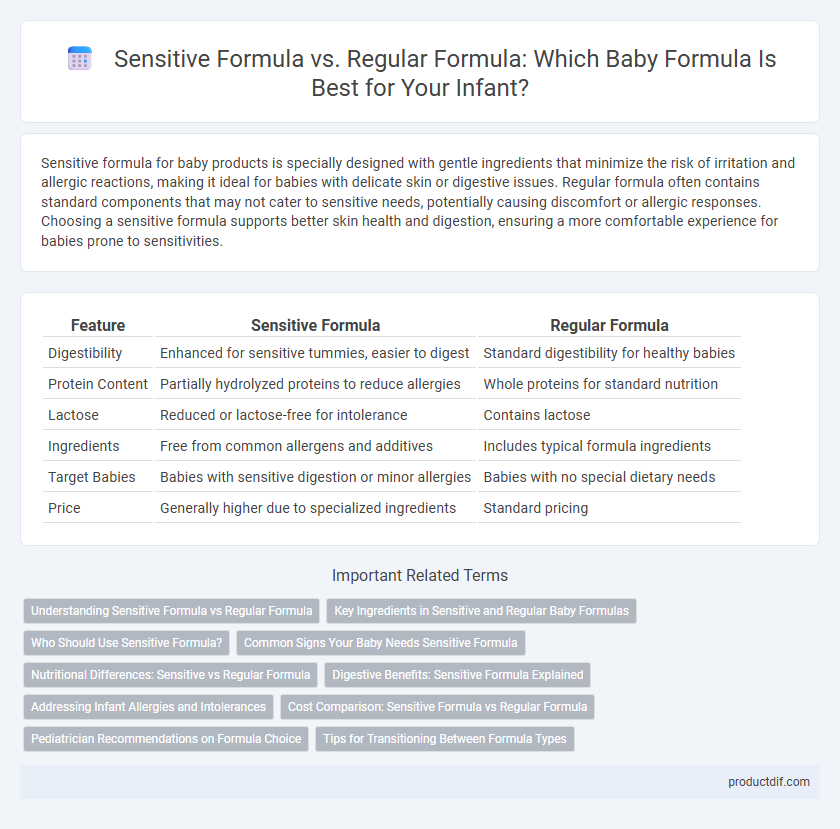Sensitive formula for baby products is specially designed with gentle ingredients that minimize the risk of irritation and allergic reactions, making it ideal for babies with delicate skin or digestive issues. Regular formula often contains standard components that may not cater to sensitive needs, potentially causing discomfort or allergic responses. Choosing a sensitive formula supports better skin health and digestion, ensuring a more comfortable experience for babies prone to sensitivities.
Table of Comparison
| Feature | Sensitive Formula | Regular Formula |
|---|---|---|
| Digestibility | Enhanced for sensitive tummies, easier to digest | Standard digestibility for healthy babies |
| Protein Content | Partially hydrolyzed proteins to reduce allergies | Whole proteins for standard nutrition |
| Lactose | Reduced or lactose-free for intolerance | Contains lactose |
| Ingredients | Free from common allergens and additives | Includes typical formula ingredients |
| Target Babies | Babies with sensitive digestion or minor allergies | Babies with no special dietary needs |
| Price | Generally higher due to specialized ingredients | Standard pricing |
Understanding Sensitive Formula vs Regular Formula
Sensitive formula is specifically designed to reduce the risk of allergic reactions and ease digestive discomfort in infants with sensitive stomachs, often containing hydrolyzed proteins and fewer allergens. Regular formula typically contains intact proteins and a broader range of ingredients suited for babies without sensitivities or allergies. Understanding these distinctions helps caregivers choose the appropriate formula to support optimal infant health and development.
Key Ingredients in Sensitive and Regular Baby Formulas
Sensitive baby formulas typically contain hydrolyzed proteins and reduced lactose to minimize allergic reactions and digestive discomfort, while regular formulas often include intact cow's milk proteins and standard lactose levels. Key ingredients in sensitive formulas also feature prebiotics and probiotics designed to support gut health and reduce colic symptoms, whereas regular formulas focus on balanced nutrients for overall growth and development. Both formulas provide essential fatty acids, vitamins, and minerals, but sensitive formulas emphasize hypoallergenic components tailored for infants with sensitivity issues.
Who Should Use Sensitive Formula?
Sensitive formula is ideal for infants who experience fussiness, gas, or constipation due to regular formula ingredients like cow's milk protein or lactose. Babies with mild milk protein intolerance or lactose sensitivity benefit from the gentle, partially hydrolyzed proteins and reduced lactose content in sensitive formulas. Pediatricians often recommend sensitive formula for infants showing signs of digestive discomfort or allergic reactions to standard formulas.
Common Signs Your Baby Needs Sensitive Formula
Frequent fussiness, excessive gas, and persistent diaper rash are common signs your baby may benefit from a sensitive formula. Babies with lactose intolerance or milk protein sensitivity often experience colic symptoms and constipation when fed regular formula. Switching to a sensitive formula designed to be gentler on the digestive system can alleviate discomfort and improve feeding tolerance.
Nutritional Differences: Sensitive vs Regular Formula
Sensitive formula for babies typically contains reduced lactose levels and partially hydrolyzed proteins to aid digestion and minimize allergic reactions, while regular formula uses standard protein and carbohydrate compositions. Sensitive formulas often include added prebiotics and probiotics to support gut health and reduce colic symptoms, which are less common in regular formulas. Nutritional differences also extend to fat blends; sensitive formulas may incorporate specific fatty acids like DHA and ARA tailored to sensitive digestive systems, promoting brain and eye development.
Digestive Benefits: Sensitive Formula Explained
Sensitive formula is specially designed for babies with delicate digestive systems, incorporating partially hydrolyzed proteins that are easier to break down and absorb. Unlike regular formula, it often contains reduced lactose and added prebiotics to promote healthy gut flora and reduce common issues like gas, colic, and constipation. These digestive benefits make sensitive formula a preferred choice for infants experiencing feeding discomfort or sensitivity.
Addressing Infant Allergies and Intolerances
Sensitive formula is specially designed to address infant allergies and intolerances by using hydrolyzed proteins or hypoallergenic ingredients that reduce allergic reactions and improve digestion. Regular formula typically contains intact cow's milk proteins, which may trigger sensitivities or digestive discomfort in infants prone to allergies or lactose intolerance. Choosing sensitive formula supports infants with immune or digestive challenges, promoting better nutrient absorption and minimizing symptoms like colic, rashes, or gastrointestinal distress.
Cost Comparison: Sensitive Formula vs Regular Formula
Sensitive baby formula typically costs 20-30% more than regular formula due to hypoallergenic ingredients and specialized processing. The higher price reflects added benefits such as reduced allergens and easier digestion for infants with sensitivities. Parents should weigh these costs against the nutritional needs and potential health advantages for their baby.
Pediatrician Recommendations on Formula Choice
Pediatricians often recommend sensitive formula for infants experiencing fussiness, gas, or mild allergies due to its reduced lactose and hypoallergenic properties. Regular formula is suitable for babies without digestive or sensitivity issues, providing complete nutrition based on standard cow's milk protein and lactose content. Choosing the appropriate formula under pediatric guidance ensures optimal infant digestion and nutrient absorption while minimizing potential allergic reactions.
Tips for Transitioning Between Formula Types
When transitioning between sensitive formula and regular formula, introduce the new formula gradually by mixing it with the current one to help your baby's digestive system adjust. Monitor your baby closely for any signs of intolerance such as fussiness, rash, or changes in stool, and consult a pediatrician if concerns arise. Maintaining a consistent feeding schedule during the transition minimizes digestive discomfort and supports overall adaptation.
Sensitive Formula vs Regular Formula Infographic

 productdif.com
productdif.com